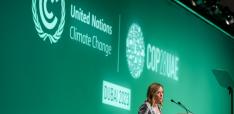The World Bank’s Legitimacy Is Derived From Citizens, Now More Than Ever
Vinay Bhargava and Blair Glencorse argue that it is time the Bank took civil society more seriously.
Back in 2017, the World Bank began an ambitious effort to improve the management of natural resources and tourism in southern Tanzania, while creating jobs and protecting the environment. While sounding like a fantastic way to support development in one of the poorest parts of the world - the Resilient Natural Resource Management for Tourism and Growth (REGROW) Project, as it was known - soon ran into difficulties. Villagers claimed they were forcibly evicted from their land, cattle were seized from pastoralists by national park rangers, and those who protested were killed or “disappeared” in order to make way for the project.
Devastated community members took their grievances to an independent complaints mechanism called the World Bank Inspection Panel- and won. It was clear that the World Bank had failed for years to listen and address the concerns of people living in southern Tanzania - and earlier this year the Bank’s senior management admitted as much in a technically phrased but entirely insufficient mea culpa:
“We regret that the REGROW project preparation and supervision did not sufficiently account for project risks, resulting in inadequate mitigation measures to address adverse impacts.”
There is no better example of the need to put people at the center of the World Bank’s work. Unfortunately, this is not an isolated case, as other Inspection Panel cases have found. Despite these serious challenges, the Bank itself has not carried out a comprehensive review of how it engages with people in the places it works or the ways in which it discloses information; nor do supervision reports provide information on actual stakeholder engagement. So, it remains unclear whether these violations continue.
World Bank President Ajay Banga has rightly stated that hundreds of millions of people and communities, including the world’s poorest, who are served by the World Bank Group are at the “heart of our work.” In 2024, the Bank made a series of promises to improve the way citizens can be included in its efforts including a new framework for this engagement, new ways of measuring how this happens, and a new facility to fund civil society organizations to support civic participation.
However, the Bank is stalling meaningful actions on Mr. Banga’s promises and the commitments the World Bank Board made last year in the Evolution Plan and IDA 21 Replenishment to deepen partnership with citizens and civil society. For example, civil society was consulted earlier this year on the renewal of the ten-year old citizen engagement framework, but senior management has not yet agreed to make the necessary changes. In October 2024, President Banga announced the start of work on a new CSO funding facility but it still does not have the means to accept funds.
Meanwhile the urgency with which the Bank needs to move to more effectively address mounting global problems is growing. Government after government- led by the US- are cutting aid and reneging on promises to partners in the developing world. In a period of rising public debt, tariffs and fiscal retrenchment, it is essential that the World Bank makes every dollar work as hard as possible for the world’s poorest. This means following through on efforts to ensure citizens have a truly meaningful say in how the Bank works on the ground with governments and communities.
The Bank must act immediately to ensure accountability not only to its own donors- its member countries- but to citizens everywhere; and take civil society more seriously by consulting community and citizen groups earlier and more meaningfully at every point. This means finalizing and institutionalizing a Civic and Citizen Engagement Framework and Scorecard Indicator on these issues, which will then allow these decisions to be translated into operational directives and guidance for staff to put people and communities at the heart of their work. It means monitoring and publishing progress in implementation of what are called Stakeholder Engagement Plans (SEPs)- which are prepared by governments to listen to the concerns and needs of their people. It means fully-supporting and funding the CIVIC facility to support civil society. And it means integrating civic and citizen engagement approaches into what are called Country Partnership Frameworks (CPFs)- the plans through which the Bank agrees on overall development goals with its partners.
These might seem like technical changes far removed from the villages around the Ruaha National Park in Tanzania where the REGROW Project took place- but if we are to overcome our collective challenges it is changes like these to our institutions that are essential, before it is too late. The upcoming World Bank Annual Meetings in October are a perfect moment for the Bank to demonstrate that it is willing to adapt to the new ways of working it has repeatedly promised.
Vinay Bhargava is Chief Technical Advisor at Partnership for Transparency Fund (PTF). Blair Glencorse is Co-CEO of Accountability Lab.
Image: World Bank building at Washington via WikiCommons CC BY 2.0


